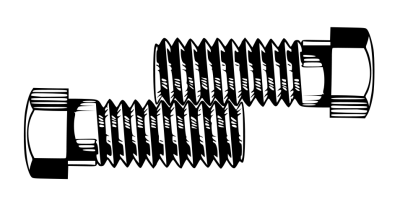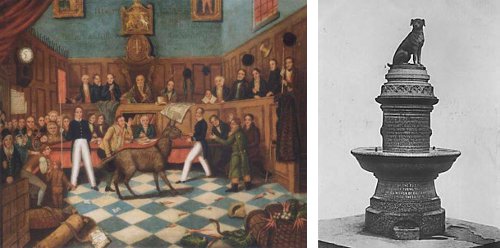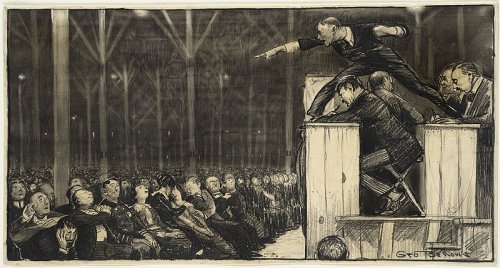
Suppose you have two identical bolts. Hold each by its head, engage the threads as shown, and revolve one about the other. Will this action pull the heads closer together or drive them farther apart?

Suppose you have two identical bolts. Hold each by its head, engage the threads as shown, and revolve one about the other. Will this action pull the heads closer together or drive them farther apart?

Richard Martin, MP for Galway, earned the nickname “Humanity Dick” for his efforts against the abuse of animals in the early 19th century. In 1822 he brought a donkey into court to display the scars of a beating, winning the world’s first conviction for animal cruelty.
Sadly, his cause was still being fought 80 years later, when the “brown dog affair” divided Edwardian England. A London physiologist had allegedly dissected a conscious terrier before 60 medical students. The physiologist won a suit for libel, but his opponents commissioned a bronze statue with a damning inscription:
In Memory of the Brown Terrier Dog done to Death in the Laboratories of University College in February 1903, after having endured Vivisection extending over more than two months and having been handed from one Vivisector to another till Death came to his Release. Also in Memory of the 232 dogs vivisected at the same place during the year 1902. Men and Women of England, how long shall these things be?
The statue occasioned four years of riots, vandalism, and controversy. Battersea Council finally had it melted down — but a replacement was erected in 1985.
Paul Dirac, the British theoretical physicist, has a reputation for being reserved and speaking little. He read E.M. Forster’s A Passage to India, and commented favorably on it. Someone in Cambridge thought the two great men ought to meet. J.G. Crowther recalls that this was arranged. The two men observed each other in long, silent respect. Presently Dirac asked, ‘What happened in the cave?’ ‘I don’t know,’ said Forster, which concluded their conversation.
— Bulletin of the Atomic Scientists, March 1971
You’re eating apples with your friend Dr. Psychic Psycho, a talented biochemist who fancies himself a clairvoyant and has made many accurate oddball predictions.
“I have interesting news for you,” he says. “You must seriously consider taking this pill. As you know (since we have recently determined it together), it contains substance X, which (as you also know — but consult this pharmacopeia if in doubt) is fatally poisonous by itself, while nevertheless furnishing unfailing antidote to poison Z — though it does have some minorly unpleasant side effects. Now the apple I gave to you, which you have just finished eating, was poisoned by me with Z — or not — in line with my prediction as to your taking or not taking the antidote pill. Benign old me, of course, only poisoned the apple if I foresaw that you were indeed going to take the antidote. And not to worry — I’m a very good predictor.”
He rushes off. What should you do?
(By University of Pittsburgh philosopher Nicholas Rescher.)
Modern times have come to China — religious teachers must now fill out a government application before they can be reincarnated.
The decree, passed in 2007, requires that applications be submitted to four different government bodies. “The selection of reincarnates must preserve national unity and solidarity of all ethnic groups, and the selection process cannot be influenced by any group or individual from outside the country.”
“Work out your own salvation,” said the Buddha. “Do not depend on others.”
The story about Dr. Abernethy and his lady patient is a classic. He was a man of few words, and the lady knew it. Being shown into his private office, she bared her arm and said simply, ‘Burn.’
‘A poultice,’ said the doctor.
Next day she called again, showed her arm, and said, ‘Better.’
‘Continue the poultice.’
Some days elapsed before Abernethy saw her again. Then she said, ‘Well. Your fee?’
‘Nothing,’ said the doctor, bursting into unusual loquacity. ‘You are the most sensible woman I ever met in my life!’
— William Shepard Walsh, Handy-Book of Literary Curiosities, 1892
In 1958, B.F. Skinner and Erich Fromm attended the same California symposium. Skinner found that Fromm “proved to have something to say about almost everything, but with little enlightenment,” and “when he began to argue that people were not pigeons, I decided that something had to be done”:
On a scrap of paper I wrote ‘Watch Fromm’s left hand. I am going to shape a chopping motion’ and passed it down the table to [Halleck Hoffman]. Fromm was sitting directly across from the table and speaking mainly to me. I turned my chair slightly so that I could see him out of the corner of my eye. He gesticulated a great deal as he talked, and whenever his left hand came up, I looked straight at him. If he brought the hand down, I nodded and smiled. Within five minutes he was chopping the air so vigorously that his wristwatch kept slipping out over his hand.
“William Lederer had seen my note, and he whispered to Halleck. The note came back with an addendum: ‘Let’s see you extinguish it.’ I stopped looking directly across the table, but the chopping went on for a long time. It was an unfair trick, but Fromm had angered me — first with his unsupported generalizations about human behavior and then with the implication that nothing better could be done if ‘people were regarded as pigeons.'”
(From Skinner’s 1983 memoir A Matter of Consequences.)
Lexicographer Wilfred Funk declared these the 10 most beautiful words in English:
Playwright Edward Sheldon declared these the ugliest:
Charles V said, “We should speak Spanish with the gods, Italian with our lover, French with our friend, German with soldiers, English with geese, Hungarian with horses, and Bohemian with the devil.”
See Euphony.

“There is not one command in all the Gospel for public worship. … The frequent attendance at it is never so much as mentioned in all the New Testament.” — William Law